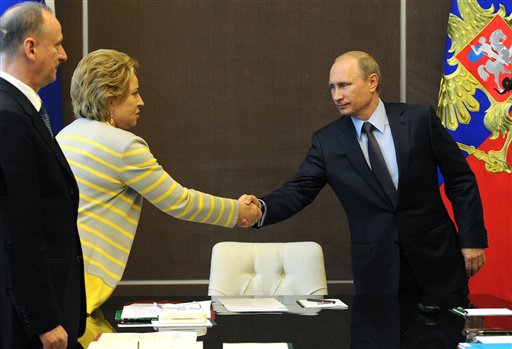MOSCOW (AP) — Russian President Vladimir Putin on Monday ordered troops deployed near Ukraine to return to their home bases and praised the launch of a dialogue between the Ukrainian government and its opponents even as fighting continued in the eastern parts of the country.
Putin specifically ordered Defense Minister Sergei Shoigu to pull back forces involved in “planned spring drills” in the Rostov, Belgorod and Bryansk regions to their home bases, the Kremlin said. The order appears to go further than a similar statement by the Russian leader two weeks ago that troops were being pulled back from the border to shooting ranges.
The three regions border Ukraine and the withdrawal of troops deployed there to other Russian provinces would signal a genuine attempt by Moscow to de-escalate the worst crisis in its relations with the West since the Cold War. It also would be easily verifiable by Western intelligence.
The Kremlin statement didn’t say how many troops would be pulled out from the three regions or specify how quick the withdrawal would be.
The United States and NATO said they saw no sign of a pullout after Putin’s earlier claim of a withdrawal. On Monday, NATO Secretary General Anders Fogh Rasmussen reiterated the military alliance has “not seen any evidence at all that the Russians have started withdrawal of troops from the Ukrainian border.”
The NATO official said the U.S.-led alliance remains open to speaking to Moscow. He said NATO has proposed meeting with Russian representatives in the NATO-Russia Council next week, but that Moscow has not yet replied.
“We’re open to a political dialogue,” Rasmussen said.
Putin’s move appears to represent an attempt to ease tensions with the West and avoid another round of crippling sanctions. The U.S. and the European Union have slapped travel bans and asset freezes on members of Putin’s entourage over Russia’s annexation of Crimea. They threatened to target entire sectors of the Russian economy with sanctions if Russia tries to derail Ukraine’s presidential vote set for Sunday.
Ukraine’s Foreign Ministry said it was checking the information about the troops’ withdrawal and urged Moscow to also cancel an air force exercise, set to take place in southwestern Russia between Wednesday and Sunday. It said the exercise — which would involve more than 70 combat aircraft, including Tu-22M long-range bombers — would fuel tensions during the vote.
Pro-Russian rebels, who have seized government buildings in eastern Ukraine and fought government troops, have declared two sprawling provinces independent and vowed to block Sunday’s vote. Ukraine and the West have accused Russia of fomenting the mutiny — claims that Russia has denied.
Facing Western pressure, Putin supported a peace plan for settling the crisis, which was brokered by the Swiss chairmanship of the Organization for Security and Cooperation in Europe.
The OSCE road map aims to halt the violence and de-escalate tensions ahead of the vote, by offering an amnesty for those involved in the unrest and urging talks on decentralization and the status of the Russian language. The OSCE also has sent an observer mission for the election.
The first round tables under the plan were held in Ukraine last week, but the government refused to invite representatives of rebels in the east, whom it dubbed “separatists” and “terrorists.”
Even though the Russian Foreign Ministry has criticized the round tables for failing to include the government’s foes, Putin welcomed them as an attempt to establish dialogue.
Foreign Minister Sergey Lavrov on Monday also sounded warmer regarding the round tables, calling them a “step in the right direction.”
Putin and Lavrov urged the Ukrainian authorities to immediately end a military operation in eastern Ukraine, where fighting continued on Monday. Pro-Russian insurgents fired on a Ukrainian army check-point near a television tower outside the eastern city of Slovyansk, killing one soldier and wounding three, Ukraine’s defense ministry said.
AP journalists also witnessed mortar fire hitting the village of Andriyivka, just outside Slovyansk. While it was impossible to confirm who fired the mortars, the shelling appeared to come from the Ukrainian government troops’ positions, damaging a gas main running across a field and onto local residents’ lands. The pipeline caught fire, but no residents were hurt.
Slovyansk has been the epicenter of fighting between Ukrainian troops and pro-Russian insurgents, who have seized government buildings across the east.
In Donetsk, the capital of one of the regions that pro-Russian insurgents declared independent last week, masked gunmen seized the office of the local branch of Ukrainian Railways. The company told the Associated Press the attackers disrupted the freight train traffic, leaving about 4,000 train cars stranded in the industrial region.
The attackers drove out the chief of the Donetsk branch of Ukrainian Railways and installed their own man, Oleksandr Vatula. He said outside the building that he is representing the Donetsk People’s Republic and pledged to restore the train traffic.
Ukraine’s central government has urged rebels to lay down arms and sit down for talks, but they say they are only prepared to discuss the withdrawal of government troops.
Amid the tensions, Ukraine and Russia traded accusations over two Russian journalists, who were arrested by Ukrainian forces near Slovyansk on Sunday.
The Ukrainian military said the two men, who had press accreditation with Life News, a Kremlin-connected TV channel, were with pro-Russian insurgents and were filming preparations for an attack outside Slovyansk. Russia has protested the arrest and asked the OSCE to assist their release.
OSCE media freedom representative, Dunja Mijatovic, urged Ukraine to release the journalists and thoroughly investigate the case. She also condemned other recent cases of harassment of journalists by conflicting parties in Ukraine, “urging all sides to stop intimidating and threatening members of the media and to let them do their jobs.”
___
Alexander Zemlianichhenko in Slovyansk, Ukraine, Nataliya Vasilyeva in Kiev, Yuras Karmanau in Donetsk and John-Thor Dahlburg in Brussels contributed to this report.

COMMENTS
Please let us know if you're having issues with commenting.